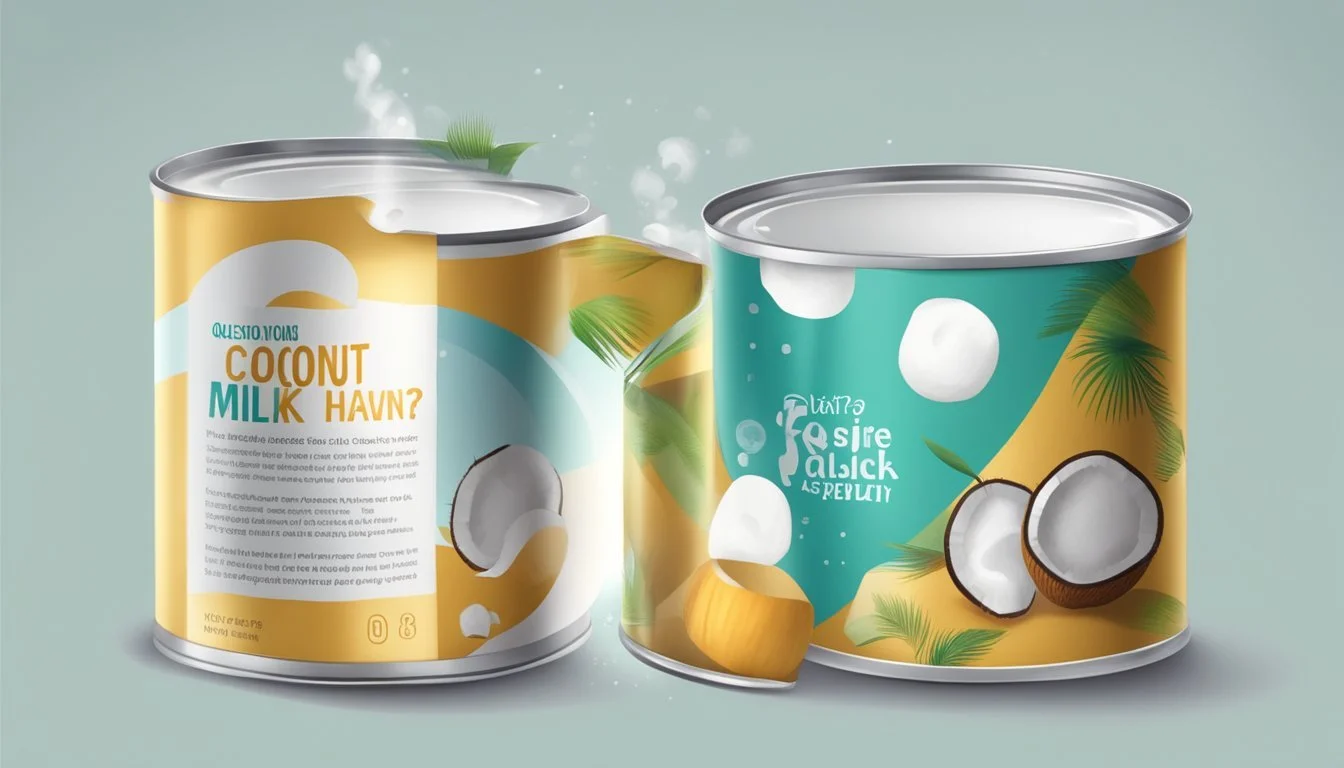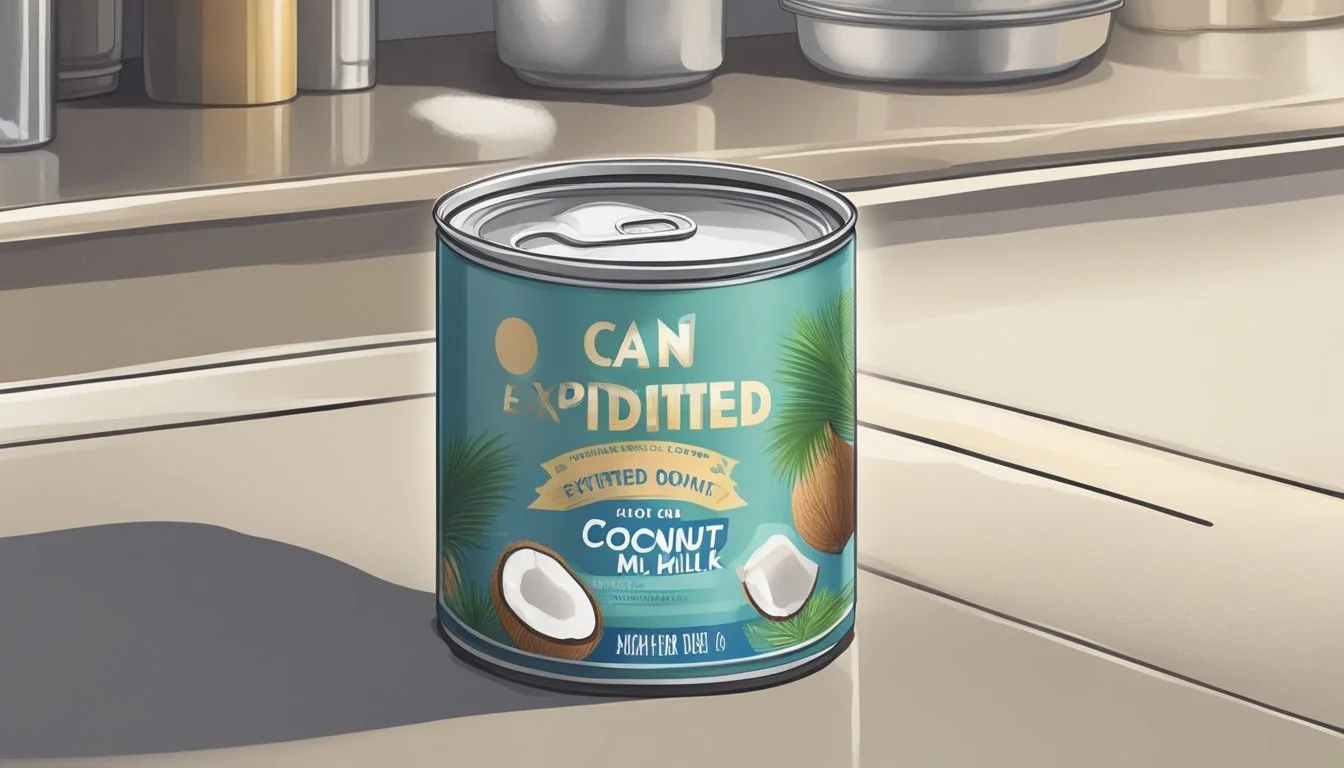Is It Safe to Use Expired Coconut Milk?
Risks and Guidelines
When navigating through kitchen cupboards, consumers often stumble upon canned goods that have passed their expiration dates—a common sight is a can of coconut milk several months beyond the suggested date. The safety and quality of consuming expired coconut milk have become a topic of interest as individuals aim to minimize waste without compromising health.
Understanding the longevity of canned coconut milk requires examining storage conditions and recognizing the signs of spoilage. Typically, unopened cans of coconut milk can be safe to use beyond the expiration date if kept in a cool, dry place. Proper storage is key, as a consistent environment can help preserve the coconut milk's integrity. Once opened, coconut milk should be stored in an airtight container within the refrigerator and used within a few days to ensure its freshness and safety.
Signs of spoilage include an off smell, a change in color, or a curdled texture. These indicators suggest that despite any date stamped on the can, the coconut milk should not be consumed. By staying informed about these factors, consumers can make educated decisions on whether to use or discard coconut milk that has surpassed its printed expiration date.
Understanding Coconut Milk
When exploring the realm of dairy-free milks, one must consider both the nature and preservation of coconut milk, including its differentiation from nut milks and its shelf life considerations.
Defining Coconut Milk
Coconut milk is a creamy liquid extracted from the grated pulp of mature coconuts. It's a staple in many culinary traditions, revered for its rich texture and tropical flavor. Unlike dairy milk, coconut milk does not naturally contain lactose, making it a popular choice for those with lactose intolerance or dairy allergies. There are two primary forms of coconut milk commonly found in stores:
Canned Coconut Milk: Typically has a longer shelf life due to stabilizers and is suitable for culinary uses that require a richer consistency.
Carton Coconut Milk: Often found refrigerated alongside other dairy-free milk alternatives, carton coconut milk is more diluted and may contain additional stabilizers and vitamins.
Coconut Milk VS Nut Milk
Coconut milk differs from nut milks in several key aspects:
Source: Coconut milk comes from the flesh of coconuts, while nut milks are made from a variety of nuts, such as almonds or cashews.
Composition: Nut milks generally have a higher water content and are less creamy than coconut milk. They often undergo a process of blending with water and straining to create a milk-like consistency.
Shelf Life: Both types of milk can spoil and have varying shelf lives depending on their processing and packaging. Typically, coconut milk's shelf life is outlined as:
Condition Shelf Life Unopened canned coconut milk Up to a year past expiration, if stored properly Opened canned coconut milk (refrigerated) 4-6 days Carton (refrigerated) Up to a month past expiration date
Coconut milk's richer fat content may contribute to it having a different shelf life compared to nut milk, which tends to have stabilizers added to maintain freshness over time.
Expiration and Shelf Life of Coconut Milk
Understanding the expiration date and the factors that affect the shelf life of coconut milk is crucial to ensure its safe use.
Expiration Date Significance
Expiration dates on coconut milk indicate the manufacturer's estimate of when the product will no longer be at its peak quality. For unopened coconut milk, the product will generally maintain its freshness for about a year past this date if stored properly. Once opened, coconut milk's shelf life reduces drastically and it is recommended to be used within a few days.
Shelf Life Variables
Several variables impact the shelf life of coconut milk, and they are primarily tied to storage conditions. When kept in the pantry, unopened coconut milk keeps longer due to a stable environment. However, once it is opened, refrigeration is a must to prolong its freshness. Opened coconut milk can last in the refrigerator for approximately 3-4 days. It is imperative to transfer it into an airtight container once opened. Here is a breakdown:
Storage Condition Duration Pantry (unopened) Up to 1 year past expiration Refrigerator (opened) 3-4 days after opening Freezer 1-2 months
Any deviation from recommended storage methods can shorten the shelf life. Consumers should always inspect coconut milk for any changes in texture, color, or odor to determine its suitability for consumption.
Storing Coconut Milk
When it comes to extending the shelf life of coconut milk, the storage method is paramount. Correct practices ensure safety and maintain quality.
Proper Storage Techniques
Unopened Coconut Milk:
Pantry: Keep in a cool, dark place such as a cupboard for up to a month past the expiration date.
Refrigerator: Up to six months past the expiration date.
Opened Coconut Milk:
Transfer to an airtight container before placing in the refrigerator.
Consume within 3-4 days to ensure freshness.
Impact of Storage on Quality
Refrigeration is crucial once the coconut milk is opened to prevent spoilage and maintain its quality.
Improper storage, such as exposure to heat or light, can accelerate spoilage and degrade the coconut milk’s flavor and texture.
Freezing Coconut Milk: It's possible to freeze coconut milk for 1-2 months, although this may affect the consistency, making it best suited for use in cooking rather than raw consumption.
Assessing Coconut Milk Quality
When determining the quality of coconut milk, one's senses are invaluable tools. Careful visual inspection and analysis of smell and texture can reveal the freshness and safety of the product.
Visual Inspection
Upon examining the coconut milk, its appearance should be uniform and creamy, typically a whitish color. Separation is common in natural coconut milk and can be resolved with stirring. However, one should be cautious of any visual cues that indicate spoilage such as:
Discoloration: Browns, yellows, or any unnatural hues can signal decay.
Mold: The presence of mold, which may appear as blue, green, or black spots, is a definitive sign that the coconut milk should not be consumed.
Smell and Texture Analysis
The smell of the coconut milk should be subtly sweet and nutty. An off smell is a clear indicator of spoilage. The texture must be smooth and consistent; any lumps or a grainy texture suggest that the coconut milk has gone bad. Spoiled coconut milk may also exhibit:
An oily texture or a rancid smell, which is a telltale sign that it should not be used.
Tactile Inspection: If the product feels slimy or has developed a thick, curd-like consistency, it may be spoiled.
One should always trust their senses to assess the quality of coconut milk, using visual and olfactory cues to ensure safe consumption.
Usage of Expired Coconut Milk
When utilizing expired coconut milk, one should assess its condition before proceeding. Safety signs such as odor, consistency, and color are critical in determining its suitability for use. Once deemed safe, it can be creatively incorporated into various culinary endeavors or used alternatively.
Culinary Applications
Expired coconut milk, if it passes a sensory evaluation (smelling neutral and looking as expected), might still be used in cooking. Its application in recipes generally includes smoothies, curries, and soups. For baking purposes, expired coconut milk can often still contribute to the moisture and flavor of baked goods. When using in coffee or teas, one needs to be extra cautious, as subtle differences in taste or smell can be more evident in such hot beverages.
Smoothies: A slightly past-date coconut milk can add creaminess.
Curries & Soups: It works as a base, imparting a mild sweetness and rich texture.
Baking: From cakes to breads, it can be a dairy substitute.
Coffee: As a creamer, it adds a tropical note.
Alternative Uses
If expired coconut milk isn't suitable for ingestion, one could still consider its usage in non-edible forms. For instance, it could be repurposed as a component in a DIY hair or skin conditioner, thanks to its moisturizing properties. This alternative usage ensures that the leftover coconut milk does not go to waste. However, if any signs of spoilage are present, it is best to err on the side of caution and discard it.
Safety Considerations When Using Expired Coconut Milk
When determining whether expired coconut milk is safe to consume, one should exercise caution. The primary concern with consuming any expired product is the potential risk of food poisoning, which can occur if the product has developed harmful bacteria.
It's essential to inspect the coconut milk before use. If the product has a sour smell, changes in texture, or any signs of mold, it is rancid and should be discarded immediately. Consuming spoiled coconut milk can lead to health implications, negating any health benefits the product originally provided.
Storage Conditions:
Unopened: Coconut milk can last 6-12 months past the expiration date if kept in a cool, dry place.
Opened (Refrigerated): Use within 3-4 days, and always in an airtight container.
Frozen: Can extend its life for 1-2 months.
Safety Checks:
Visual: Look for bulging or damage to the can.
Olfactory: Smell the product for any off odors.
Tactile: Check for changes in texture.
If the coconut milk has only slightly passed its expiration date, it is often still safe for consumption provided it passes the above checks. However, one should prioritize health and err on the side of caution if there's any uncertainty regarding the milk's quality.
In summary, while there might be some leeway with expiration dates, safety should always be the priority. The potential benefits of consuming expired coconut milk are far outweighed by the risks if it has gone bad. Always prioritize your health and safety over the potential waste of an expired product.
FAQs About Coconut Milk Expiry
In this section, readers will gain insights into specific guidelines on freezing and thawing coconut milk, as well as understanding packaging and date labels to ensure safety and quality.
Freezing and Thawing Guidelines
Freezing coconut milk can extend its shelf life far beyond its expiration date, allowing it to be safely consumed for additional months. Consumers should follow these steps for optimal results:
Freezing: Store coconut milk in an airtight container or freezer-safe bag. It's important to leave some space to account for expansion during freezing. Coconut milk can be frozen for 1 to 2 months.
Thawing: Thaw the coconut milk in the refrigerator to maintain its quality. Before use, give it a good shake to reincorporate any separated components. Use thawed coconut milk quickly to avoid spoilage.
Packaging and Date Labels
The information provided on coconut milk packaging is crucial for determining the product's shelf life. Here are the key points to keep in mind:
Date Labels: While "Best By" dates are indicative of peak quality, unopened coconut milk can often be safe to consume up to a year past the expiration date if stored in a cool, dry place.
Packaging: Once opened, coconut milk must be stored in an airtight container and refrigerated. Opened coconut milk should be used within 4-6 days.





